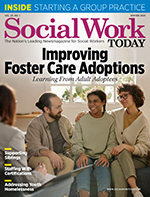|
Winter 2025 Issue Letter to the Editor To the Editor: Yes, men have feelings, too. The article “Grief After Pregnancy Loss,” in the Fall 2024 issue poignantly addressed how men tend to stifle their grief to support and/or be strong for the mother as if they have no right to their feelings, and I can tell you from personal experience, this is true. When my late fiancé and I had a miscarriage, he turned to drinking to cope, which greatly affected our relationship, especially when he stopped communicating. Mothers do feel the loss differently as we are growing the baby, but men are often omitted from the grief process by the mother and other women. The assumption is that men can’t feel that sadness because they have not grown the child; this is blatantly wrong on so many different levels and needs to be fixed, changed, or corrected. Allowing men to express their feelings begins at home when they are growing up. Parents need to and should encourage their children to openly express feelings in order for them to learn coping skills, with play being a key component; this also means parents need to be emotionally competent as well. Capurso and Ragni1 state that Lev Vygotsky believed that children could learn self-regulation through play; Erik Erikson believed that play is used to deal with emotional dilemmas; and Sigmund Freud believed that play connects us to our emotions. This means parents and children can act out scenarios in which feelings and emotions can be addressed in a productive manner. Children need to understand their feelings and how to handle the behaviors or thoughts associated with them in a way that does not create harm. Showing emotion should not be seen as a weakness but a strength regardless of gender. Encouraging men to engage in expression and self-care practices will benefit both parties as they navigate the loss of a child together, bringing them closer as a couple. Sincerely, Reference |


